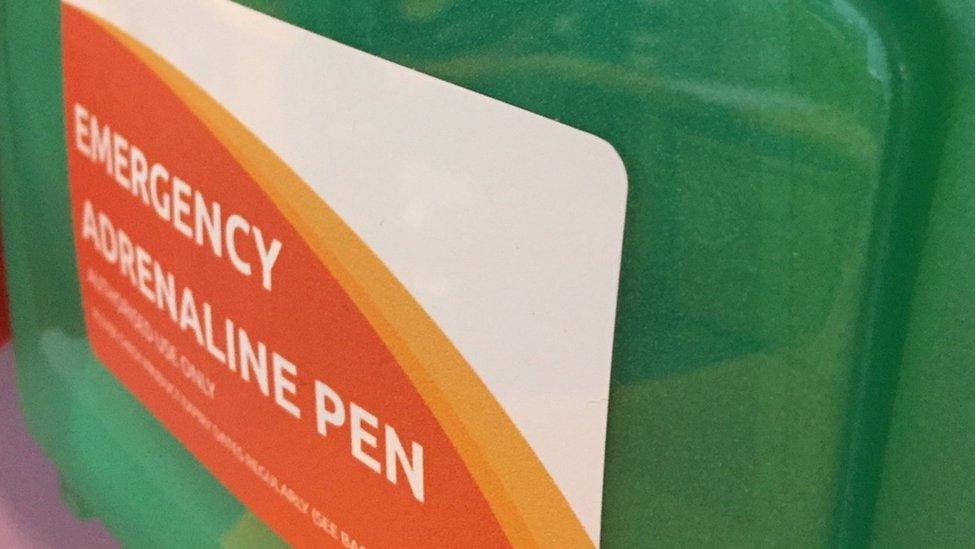Allergy death mum's plea to schools to save lives
- Published
Karanbir Cheema died in intensive care after a fatal allergic reaction
The death of a boy after a severe allergic reaction at school is being investigated by the Health and Safety Executive, the BBC has learned.
At the inquest, the coroner called the school's emergency response to Karanbir Cheema's anaphylaxis "inadequate".
Leading allergy specialist Dr Adam Fox says every school in England should have to hold emergency adrenaline pens.
The Department for Education says it has changed the regulations to allow schools to buy them.
Karanbir's mother, Rina Cheema, wants people to see the photograph of her son in intensive care - so they understand an allergy can kill.
She has lost her only child as a result of an extreme reaction as rare as it is devastating.
Karanbir suffered an anaphylactic reaction after cheese was flicked at him by another pupil at break time at his school in Greenford, West London.
Serious symptoms include swelling of the tongue and throat, vomiting and difficulty breathing. And if an emergency shot of adrenaline is not received, then the reaction can be fatal.
His mother describes herself as living in a black hole of depression because of the loss.
"I expected him to return home, sent him to a place where I thought he'd be safe, where I thought they'd look after him, only to find out nobody knew what they were doing," she says.
When the incident happened, in 2017, Karanbir went straight to the school office, where he was given his asthma inhaler and an antihistamine - but he continued to deteriorate.
After 10 minutes, his adrenaline pen was used by staff - but it was out of date and the second, back-up, pen was not in place.
An ambulance was called - but as paramedics arrived at Karanbir's side, half an hour after he had alerted staff, he went into cardiac arrest.
The oxygen loss he suffered during the reaction was devastating - and he died 11 days later in hospital.
'Take allergies seriously'
Rina now wants all schools to educate pupils and staff about the risks and how to deal with them
"Please take allergies seriously, it can cost life, it has cost a child's life," she says.

Rina Cheema is devastated by the loss of her son
Within months of Karanbir's death, the law was changed to allow schools to buy emergency adrenaline pens.
They cost about £50 to £70 each and can be used where there is no alternative available or no pen has been prescribed.
Life-threatening reactions are extremely rare but they are also hard to predict.
About 5% of children in the UK have an allergy. Adverse reactions to food are the most common.
And just because a child has never had a severe reaction, that does not mean it might not happen in the future, particularly if they have poorly controlled asthma.
Lily Dowling, 15, was in a science lesson when she started feeling strange and vomited.

Sara Dowling knows her daughter, Lily, is lucky to be alive
By the time she reached the school office, her tongue was swelling and she was struggling to breathe.
"It was like someone was pushing down on my throat and sat on my chest," she says.
"We'd learnt about anaphylaxis but I'd never thought it would happen to me."
Lily has had a dairy allergy since she was a baby but had never had a severe reaction.
This time, she was experiencing anaphylaxis, without knowing how she had come into contact with an allergen.
'I could have lost her'
Her life was saved by the head of pastoral care at Accrington Academy, Rhonda Mooney, who immediately used one of the school's emergency adrenaline pens.
Posters around the school make it clear where they are stored.
"I always think what if that pen wasn't available," says her mother, Sara, "paramedics could have taken five or 10 minutes and I could have lost her."
Mrs Dowling can't understand why every single school doesn't have to have them - nor can British Society of Allergy and Clinical Immunology president Dr Fox, one of the leading children's allergy specialists in the UK.

Dr Fox says there is a misplaced anxiety about emergency adrenaline pens
He gave evidence at Karanbir's inquest and is alarmed by the patchy understanding of allergies in some schools.
"We'd really like that to become mandatory so all schools have those adrenaline auto-injectors in place for those emergencies," he says.
Dr Fox says there is a misplaced anxiety about using adrenaline pens.
"If there is any concern that there is a serious reaction, the advice is there should always be prompt early use of adrenaline," he says.
Geoff Barton, General Secretary of the Association of School and College Leaders, says while schools are not required to hold spare devices, they are conscious that awareness and management of allergies is crucial.
Their priority would be to ensure that children with severe allergies are supported and staff are trained in how to respond to the signs and symptoms of anaphylaxis, he says.
"We would welcome any further advice or guidance on this important matter."
The DfE said it understood the seriousness of severe allergies.
"We are clear that children with medical conditions should be properly supported to enjoy a full education and be safe at school," an official said.
"All schools are required to make arrangements to support pupils with medical conditions.
"Allergies are included in the new mandatory health education curriculum, so that children also understand the facts and science relating to allergies. "
Abbé tells the BBC about how growing up with fatal allergies made school life difficult
